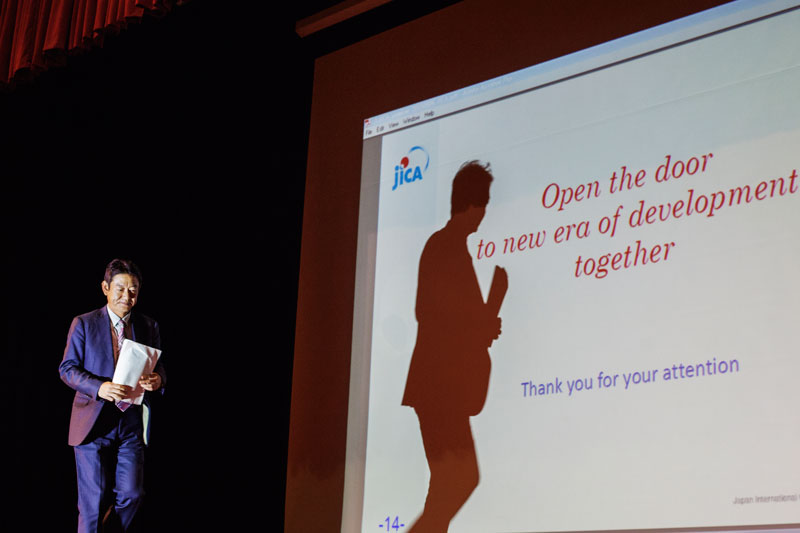As Phnom Penh’s population expands in the coming decades—with expectations of 2.6 million people by 2035 and 5 million by 2050—Japan’s development agency on Thursday hosted a conference to review its plan to curb traffic congestion in the capital.
About 200 people gathered at the Japan-Cambodia Cooperation Center for a rundown of the urban transport master plan put together by the Japan International Cooperation Agency (JICA), a long-term project to alleviate worsening traffic in the city.

Though Japanese plans for a public transport system in Phnom Penh have been in the works since 2001, it wasn’t until last year that the city’s first public bus line saw some success, with City Hall taking over the project and adding routes.
Tram Iv Tek, the Minister of Public Works and Transportation, said on the sidelines of the Cambodia-Japan Seminar on Urban Transport on Thursday that the government and JICA had analyzed the situation and decided that the future of the city’s transport network needed to include rail transit.
“The train [system] is a good solution, and it would be a modern one, because it doesn’t require a driver,” Mr. Iv Tek said, adding that plans for a rail line connecting Phnom Penh International Airport to the city center were already in the works.
“We have already developed the plan, which will mean that [travelers] won’t miss their flights because of traffic jams,” he said, noting that a rail transit system was unlikely to be completed before 2035.
JICA has recommended beginning construction in 2020, but the minister appeared to be in less of a hurry, saying that he was looking for a solution that would serve the city by 2050.
“That’s when Phnom Penh reaches 5 million, then we will need a metro,” he said.
The plan put forward by JICA on Thursday—which also includes the upgrading of roads, waterways and traffic control systems—would not be cheap, the minister said, though his estimate for how much the rail system would cost seemed off.
“I don’t know how much will be spent, but normally in Western countries, they spend an average of $10 million on similar projects,” he said.
In JICA’s outline of the rail project, the least costly route—a 13-km stretch beginning at Olympic Stadium and heading west—would cost $586 million.
City Hall spokesman Long Dimanche said he did not know how much it might cost to implement JICA’s plan.
“The Japanese government came to Cambodia and offered their opinion that the traffic jams in our city were the main problem, and now JICA is working on it, but it is their plan and I don’t know how much it will cost,” he said.
Mr. Dimanche went on to praise the efforts of Japan and said that putting the plans into action would likely be a matter of finding the funding, before they become part of the city’s own blueprint.
Japan has recently ramped up its support of infrastructure projects in the region, with the Mekong-Japan Action Plan 2015 adopted by Cambodia and its four neighbors at the Asean Summit in Kuala Lumpur earlier this week. As part of the plan, Japan pledged to set aside $6.1 billion to improve the region’s infrastructure and boost its economy over the next three years.
JICA spokesman Egami Masahiko said it was not clear yet whether Phnom Penh’s urban transport plan would receive funding under the Mekong grant. But he said that helping Cambodia develop was crucial, with the amount of Japanese investment in the country growing quickly.
“There are already a number of projects on the plan being implemented, and whether the rail system is approved is for the [Cambodian] government to decide,” he said.